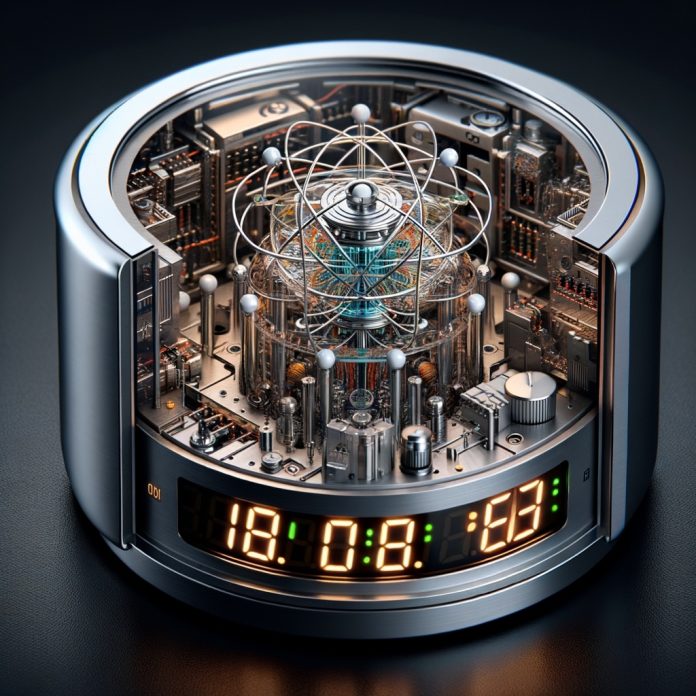A pioneering UK-built atomic clock promises to transform military operations with advanced quantum technology, enhancing security and precision in the field.
Developed by the Defence Science and Technology Laboratory (Dstl), the cutting-edge quantum clock innovation is set to redefine how timekeeping supports modern defence systems.
The atomic clock is the product of a collaboration between leading research institutions and defence partners.
The trial, part of the Demonstration of Advanced Timing Apparatus (DATA) project, involved Infleqtion, Aquark Technologies, HCD Research, and Imperial College London, along with Dstl’s in-house quantum laboratory.
This marks the first instance of testing a UK-built optical atomic clock outside a laboratory, a critical step in assessing its potential to replace vulnerable Global Navigation Satellite Systems (GNSS).
By providing a stable and sovereign-controlled timing capability, this innovation addresses national security risks associated with GNSS dependency.
UK Minister for Defence Procurement and Industry, Maria Eagle MP, explained: “Integrating cutting-edge technology into existing capabilities exemplifies the Government’s commitment to innovation in the defence sector and to ensuring our Armed Forces have the best kit possible to keep us secure at home and strong abroad.
“The trialling of this emerging, groundbreaking technology could not only strengthen our operational capability but also drive progress in industry, bolster our science sector and support high-skilled jobs.”
Atomic clocks: A leap forward in precision
The revolutionary quantum clock, constructed with state-of-the-art technology, achieves unprecedented timekeeping accuracy, losing less than one second over billions of years.
Its remarkable precision enables applications that extend far beyond standard timekeeping, including improved intelligence, surveillance, and reconnaissance capabilities.
This new device represents a major step forward in decreasing reliance on GPS systems, which adversaries can disrupt or block.
Within the next five years, it will be deployed in military operations, enhancing the UK’s defence capabilities by providing an independent, sovereign-controlled time source.
Enhancing military capabilities
The potential applications of the atomic clock are vast and transformative. Creating a highly accurate and independent navigation system reduces the vulnerability to GPS jamming or destruction during conflicts.
The clock’s ability to synchronise time with extreme precision is crucial for securing encrypted military communications and advancing weapon systems’ accuracy, such as guided missiles.
Moreover, the quantum clock will provide a significant advantage in timing-critical operations, including cyber warfare, where milliseconds can determine success. This innovation will give UK Armed Forces a technological edge in modern conflict scenarios.
Beyond the battlefield: Broader applications
The applications of this quantum clock are not limited to military use. Enhanced GPS accuracy derived from this technology could revolutionise global navigation systems, improving everything from satellite communications to civilian aviation.
In addition to precision, researchers are working to miniaturise the technology for mass production, enabling its integration into smaller devices such as military vehicles and aircraft.
Future atomic clock development
Ongoing research will continue to refine the performance of quantum clocks, exploring their limitations and optimising their functionality. These advancements are expected to bolster national infrastructure resilience, ensuring precise timing for critical operations even in challenging scenarios.
The potential benefits of this groundbreaking technology underscore its importance in safeguarding national security and supporting the UK’s economic and technological leadership.
Dstl’s Chief Executive, Paul Hollinshead, added: “This first trial of advanced atomic clock represents a significant achievement in the UK’s quantum technology capabilities.
“The data gathered will not only shape future Defence efforts but is also a signal to industry and academia that we are serious about exploring quantum technologies for secure and resilient operational advantage.”
As the UK pioneers this new frontier in quantum technology, the atomic clock not only secures a brighter future for defence and infrastructure but also reinforces the nation’s position as a global leader in innovation.
With unparalleled precision and resilience, this groundbreaking technology ensures enhanced security and operational capability, solidifying its role as a cornerstone of modern defence strategy.









